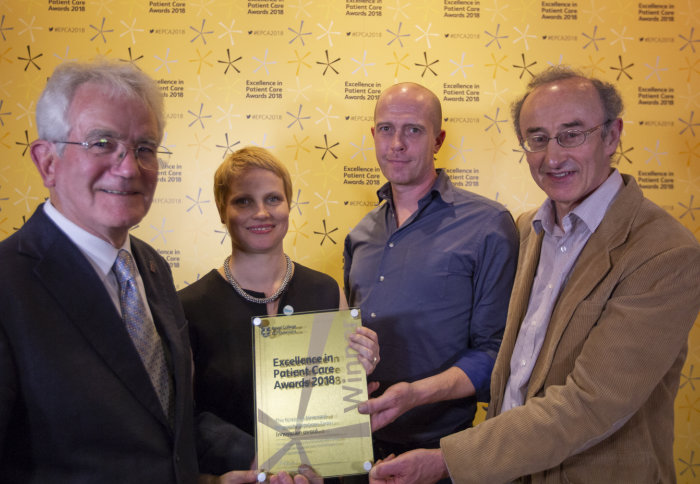Imperial innovators receive prestigious Royal College of Physicians award

(L-R): Prof Andrew Wilkinson (University of Oxford), Zoe Chivers (Bliss), Richard Colquhoun, Dr Nicholas Longford
Congratulations to the National Neonatal Research Database team on receiving an RCP Excellence in Patient Care Award for Innovation.
The winners of the Royal College of Physicians’ (RCP’s) Excellence in Patient Care Awards 2018 were announced at a ceremony in central London last week.
The National Neonatal Research Database (NNRD) team, led by Professor Neena Modi from the Department of Medicine, were the winners of the Innovation award, which recognises and rewards the innovative use of new or existing technologies and/or processes that have contributed to significant improvements in patient care or health outcomes.
Building a unique resource
The NNRD receives clinical data from all neonatal units across England, Scotland and Wales, and makes this information available to support and improve health services, patient care and research. At present, the database holds the details of nearly one million babies and their care history, and is used by a number of different bodies including the NHS, Public Health England and the Department of Health. The database is maintained and managed by the Neonatal Data Analysis Unit (NDAU) at Imperial College London and Chelsea and Westminster NHS Foundation Trust.
Following the creation of the NDAU in 2007, the team’s goal was to develop a single source of high quality neonatal data that could be utilised to improve newborn care and health services. Today, approximately 1 in 8 newborn babies is admitted to one of the 200 neonatal critical care centres based across England, Scotland and Wales.
The team assembled a research group and steering board, which included representation from doctors, parents, scientists and charitable organisations. After lengthy consultations with the public and key stakeholders, the team were able to submit a request to create a new NHS Information Standard – the Neonatal Dataset – which was approved in 2013. By 2014, every neonatal unit in England, Wales and Scotland was contributing to the NNRD, with all neonatal units in Northern Ireland set to join before the end of this year.
Improving services and facilitating research
The NNRD is now used for an extensive and growing range of outputs, including national audits, surveillance, quality improvement, health services evaluations, and clinical and health services research. The database has also been used in national quality improvement programmes (QIP), notably the East of England Neonatal Networks QIP to improve preterm breast-feeding, and the Royal College of Obstetricians & Gynaecologists Each Baby Counts QIP to reduce adverse birth incidents.
Additionally, the NNRD has been used as a source of UK data to a number of international research studies and programmes, including eNewborn, a European neonatal evaluation and benchmarking platform established at Saint-Pierre University Hospital in Brussels, and iNeo, an international health services research programme led by the University of Toronto, Mount Sinai Hospital, Canada.

Upon announcing the award, the RCP described the NNRD as “a powerful, unique resource for improving healthcare [that] has achieved high impact as a single source of high-quality data, reducing burdens and costs by eliminating multiple collections.”
Commenting on the team’s success, Professor Modi said: “We are thrilled that the contributions of neonatal teams around the country and the collaborative spirit they have shown have enabled us to deliver a really powerful benefit to newborn care and health services. This award is recognition of hard work extending over a decade.”
Image credit: Royal College of Physicians
Article text (excluding photos or graphics) © Imperial College London.
Photos and graphics subject to third party copyright used with permission or © Imperial College London.
Reporter
Ms Genevieve Timmins
Academic Services